Victory! Notorious Primate Lab Drops Quest for San Antonio Bond Funding
Update: December 16, 2021
Massive win for primates! After many of the 22,000-plus PETA supporters in San Antonio objected, Texas Biomedical Research Institute, home of the notorious Southwest National Primate Research Center, withdrew its request for $11 million from the taxpayer-funded San Antonio bond program. Local PETA SOS hub organizer Mariah Smith testified at multiple public hearings, along with other PETA supporters. Our members, Texas Animal Freedom Fighters, and other concerned constituents submitted public comments and called their elected officials to tell the city to say NO to funding this notorious primate laboratory.
PETA will stay vigilant to ensure that no San Antonio tax dollars go to funding animal laboratories.
Original post:
Texas Biomedical Research Institute (TBRI), home of the notorious Southwest National Primate Research Center (SNPRC), is begging the city of San Antonio to issue an $11 million taxpayer-funded bond to prop up its diseased and cruel monkey laboratory.
We need your help to prevent this outrageous proposal from being approved.

Today, the city’s bond committee will issue a prioritized list of projects for the city council and mayor to consider funding. The mayor needs to hear from you about why you don’t want your money used for cruel experiments on primates.
The SNPRC is one of the remaining seven “flagship primate centers” established and funded by the National Institutes of Health and is one of the largest primate laboratories in the world. Experimenters intentionally infect monkeys with pathogens such as HIV/SIV (simian immunodeficiency virus), tuberculosis, malaria, and Zika virus. Tens of thousands of primates have suffered and died in these experiments, yet we still don’t have effective vaccines for the infections.
Not only is the SNPRC really bad at science, in the last decade, the U.S. Department of Agriculture also fined Texas Biomed nearly $26,000 for repeatedly allowing primates to escape from cages and injure themselves and others, including humans. The fine didn’t stop its carelessness. In 2018, four baboons escaped. Multiple monkeys died by strangulation when they became entangled in a door cable. In February, 159 baboons suffered from painful frostbite so severe that their fingers, toes, or tails had to be amputated. The SNPRC can’t even keep monkeys safe, so it’s no wonder that it hasn’t been able to deliver on the promised vaccines.
Texas Biomed, which runs this monkey prison, is attempting to fool the city of San Antonio about its ability to produce treatments and cures for humans. The mayor needs to learn the truth and see that his constituents do not support the bond as currently proposed.
Please make it clear to San Antonio Mayor Ron Nirenberg that you will not support the bond program when it comes up for a vote if it includes this handout to monkey tormentors.
Feel free to use these talking points:
- Texas Biomedical has a long history of failing to provide the thousands of primates at its facility with basic care. Earlier this year, 159 baboons suffered from painful frostbite so severe that their fingers, toes, or tails had to be amputated.
- The primate center at Texas Biomedical is a health threat to our community. It’s the only privately owned animal biosecurity level four laboratory in the country, exposing primates to Marburg, Ebola, tuberculosis, and other dangerous viruses and diseases. With its history of primate escapes and staff carelessness, Texas Biomedical should be paying the city for the risk that it poses to our community—not the other way around.
- The monkeys warehoused by Texas Biomedical are infected with Chagas disease, a public-health threat that the company has known about for more than a decade. Chagas can cause serious, lifelong illness. Humans, monkeys, dogs, and many other species of domestic and wild animals are susceptible to infection. The blood-sucking insect vectors of Chagas disease are found throughout Texas and are particularly common in the south-central part of the state. A recent publication from neighboring Tulane National Primate Center stated that the presence of outdoor-housed monkeys is playing a part in local parasite transmission, which may well be the case in the San Antonio area.
- Texas Biomedical is located at ground zero of Valley fever, and monkey experimenters have recently admitted that monkeys exposed to and/or infected with this disease should not be used for HIV/SIV research. This is just another of the reasons why the thousands of monkeys confined at Texas Biomedical should not be used in research.
- Texas Biomedical already receives millions of taxpayer dollars through NIH, including its core grant of nearly $7.5 million for this year alone.
- Monkeys are not good models of diseases that affect humans. Despite decades of HIV experiments on monkeys at Texas Biomedical and the other national primate research centers, HIV vaccines that look successful in them fail when used in humans. Monkeys are not miniature humans.

